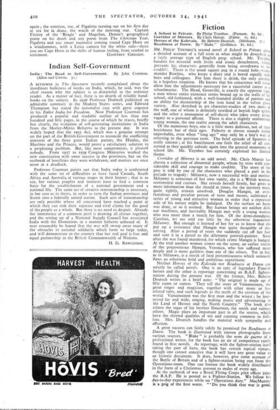Indian Self-Government
A REVIEWER in The Spectator recently complained about the inordinate bulkiness of works on India, which, he said, was the chief reason why the subject is so distasteful to the ordinary reader. As a matter of fact, there is no dearth of reliable hand- books on the subject. In 1936 Professor Dodwell published an admirable summary in the Modern States series, and Edward Thompson has stated the nationalist case with great cogency in his Enlist India for Freedom. Now Professor Coatman has produced a popular and readable outline of less than one hundred and fifty pages, in the course of which he traces, briefly but clearly, the evolution of self-governing institutions in India from the Morley-Minto Reforms to the present day. It was widely hoped that the 1935 Act, which was a genuine attempt on the part of the British Government to reconcile the conflicting interests of the three great Indian parties, the Hindus, the Muslims and the Princes, would prove a satisfactory solution to a perplexing problem. But, like most compromises, it pleased nobody. From 1937 to 1939 Congress Ministries worked the new constitution with some success in the provinces, but on the outbreak of hostilities they were withdrawn, and matters are once more at a deadlock.
Professor Coatman points out that India today is confronted with the same set of difficulties - as have faced Canada, South Africa and Australia at various stages in their history ; that is to say, her various peoples and interests have to find a common basis for the establishment of a national government and a national life. The same act of creative statesmanship is necessary, in her case as in theirs, in order to turn the Indian provinces and States into a federally united nation. Such acts of statesmanship are only possible where all concerned have reached a point at which they can sink their separate and rival claims for the good of the people as a whole. But there is no need to despair. Already the imminence of a common peril is drawing all classes together, and the setting up of a National Supply Council has associated India with the Dominions in a manner hitherto unheard of. It may reasonably be hoped that the war will sweep away many of the obstacles to national solidarity which loom so large today, and will demonstrate to the country that her real goal is free and equal partnership in the British Commonwealth of Nations.
H. G. RAWLINSON.


























 Previous page
Previous page